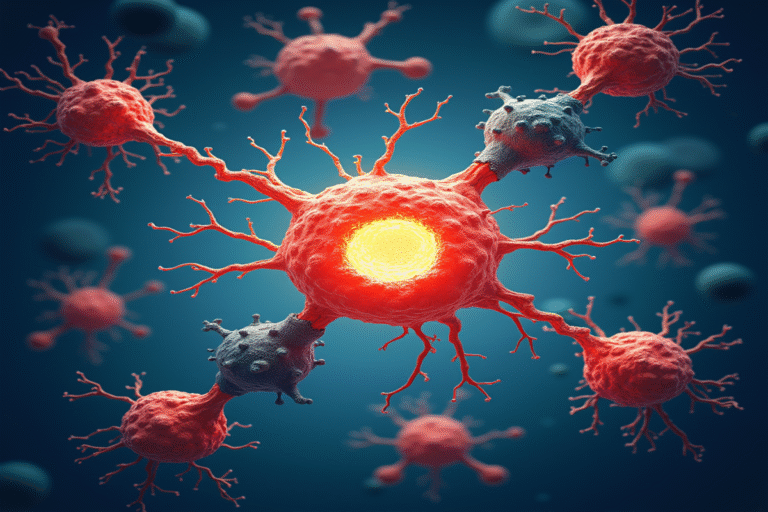Vitamin B12 stands out as one of the most structurally complex vitamins your body needs – and it’s the only vitamin that contains a metal. This cobalt-containing molecular marvel (hence its scientific name “cobalamin”) performs critical functions that keep your nervous system working properly and your blood cells healthy.
The Molecular Marvel: Not Your Average Vitamin
When scientists first isolated vitamin B12 in 1948, they discovered something remarkable: a massive, intricate molecule with a cobalt atom at its core, surrounded by a corrin ring structure. This unique architecture makes B12 approximately 100 times larger than the simplest vitamin (vitamin C) and allows it to participate in crucial biochemical reactions that other vitamins cannot perform.
Your Nervous System’s Protective Shield
One of B12’s most important roles is maintaining your nervous system’s integrity. Here’s how it works:
- Myelin maintenance: B12 is essential for producing and maintaining myelin – the protective fatty sheath that insulates nerve fibers, similar to the plastic coating around electrical wires. Without enough B12, this insulation deteriorates, causing signals to slow down and possibly “short circuit.”
- Methylation support: B12 is involved in a process called methylation that helps produce neurotransmitters, the messengers that transmit signals between nerve cells. Without this, your nervous system’s communication network breaks down.
- Homocysteine regulation: B12 helps convert the amino acid homocysteine into methionine. Without sufficient B12, homocysteine can build up, potentially harming nerve cells and blood vessels.
The Red Blood Cell Factory
Every second, your body produces around 2 to 3 million new red blood cells – and vitamin B12 is essential for this. Here’s why:
- DNA synthesis: B12 plays a crucial role in synthesizing DNA, which is necessary for all cells to divide and replicate properly.
- Cell maturation: Without enough B12, developing red blood cells can’t divide properly and become unusually large and fragile (megaloblastic anemia). These malformed cells can’t carry oxygen efficiently and die prematurely.
- Iron utilization: B12 works together with folate to help your body use iron effectively for hemoglobin production – the protein that gives blood its red color and carries oxygen.
The Absorption Adventure
Perhaps the most fascinating aspect of B12 is its complex absorption process – unlike any other nutrient. To get from your food to your cells, B12 goes through a multi-step journey:
- When you consume B12, it initially binds with proteins in your saliva.
- In your stomach, hydrochloric acid and enzymes free the B12 from these proteins.
- B12 then binds to a specific protein called intrinsic factor, which is produced by cells in your stomach lining.
- This B12-intrinsic factor complex travels to your small intestine, where specialized receptors recognize and absorb it.
- The vitamin finally enters your bloodstream and is transported throughout your body by carrier proteins.
This elaborate process explains why about 1.5-15% of people have difficulty absorbing enough B12, especially as they age or if they have certain digestive disorders.
When B12 Runs Low: The Mysterious Symptoms
B12 deficiency produces a peculiar mix of symptoms that might seem unrelated but come from its central roles in nerve function and blood cell formation:
- Tingling or numbness in hands and feet
- Balance problems and difficulty walking
- Memory lapses and confusion
- Extreme fatigue and weakness
- Smooth, red tongue and mouth ulcers
- Mood changes including depression or irritability
Interestingly, neurological symptoms can appear before changes in blood tests, highlighting just how crucial B12 is for nerve health.
The Evolutionary Mystery
Here’s a curious evolutionary puzzle: B12 is primarily found in animal products (meat, fish, dairy, eggs), yet it’s essential for all mammals, including herbivores. So how do vegetarian animals get their B12? Unlike humans, many herbivores have bacteria in their digestive systems that produce B12. Humans lost this ability over time, making B12 the only vitamin we must obtain strictly from our diet or supplements.
This microscopic marvel demonstrates nature’s remarkable biochemical engineering that keeps our bodies working. From protecting the information superhighways of the nervous system to enabling the production of red blood cells that carry oxygen, vitamin B12 performs essential behind-the-scenes work that keeps us thinking clearly, moving confidently, and energized for life.





